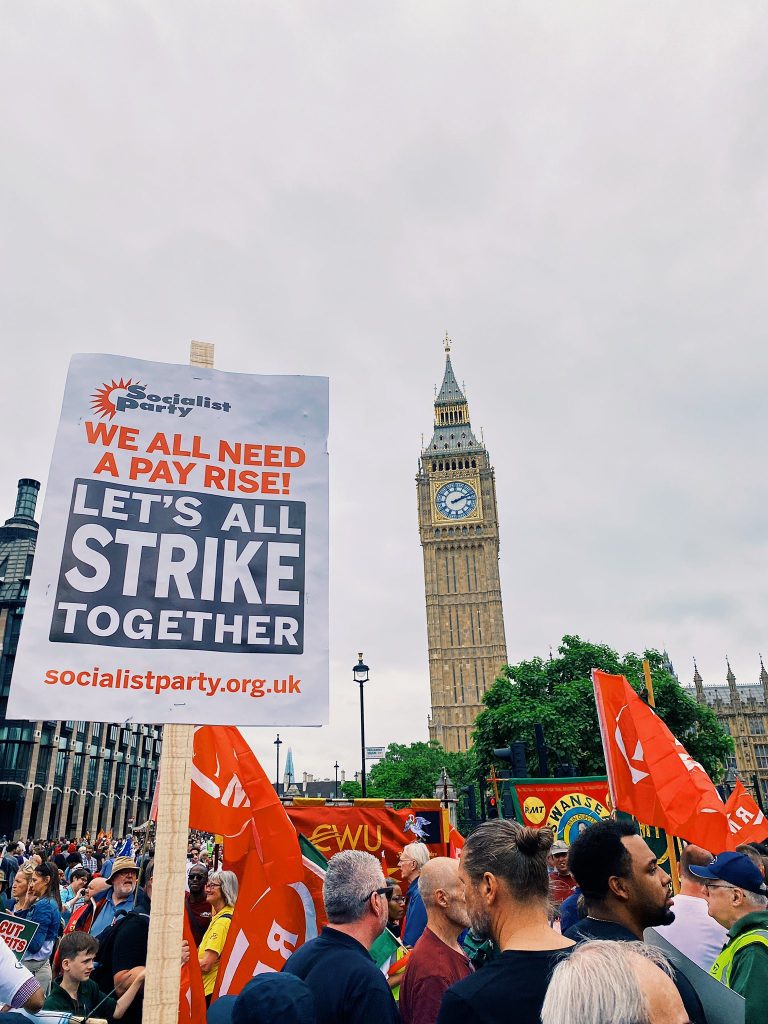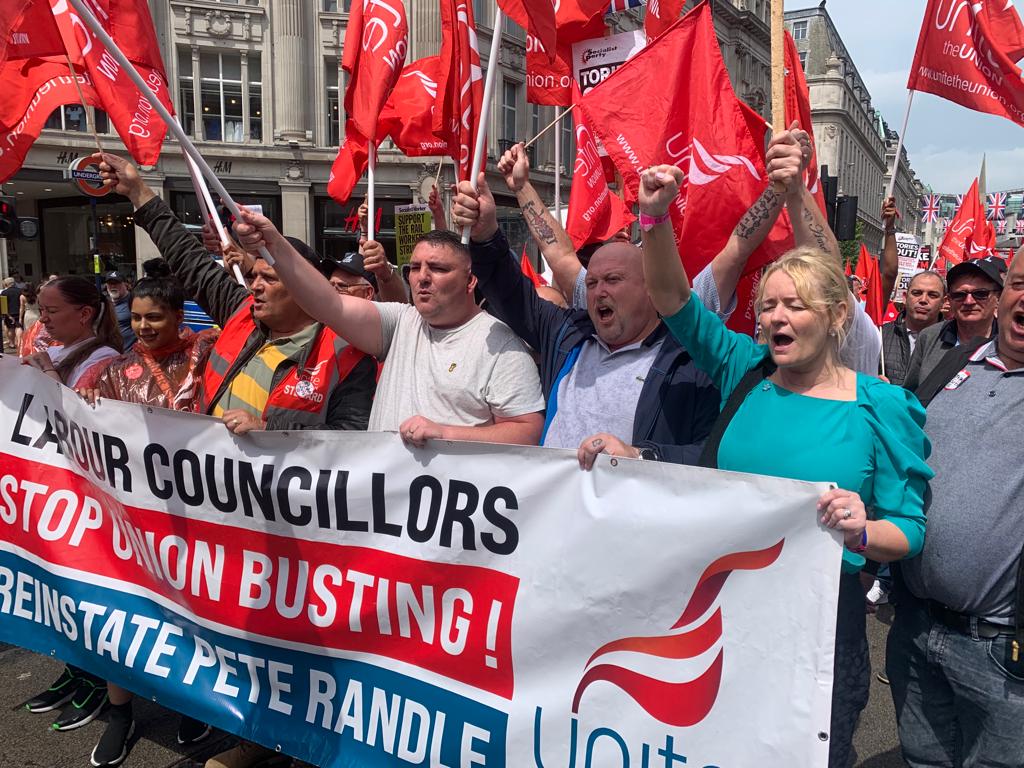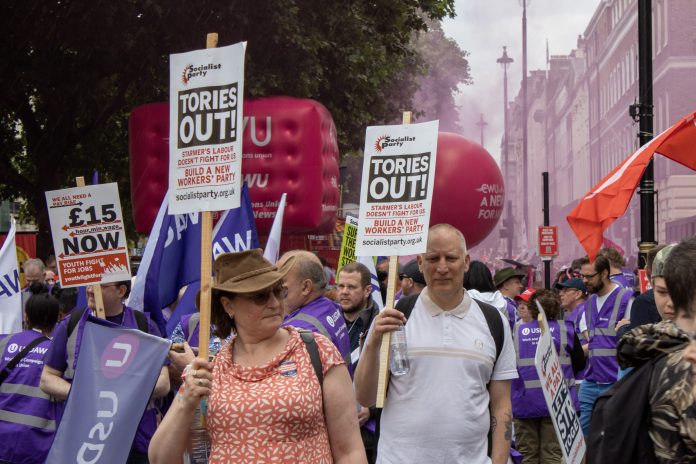Thousands of NHS workers, social care workers, council workers, school support staff and more marched through central London streets behind Unison banners and balloons. Then came the Unite contingent, led by a brilliant delegation of Coventry bin strikers. Behind them were bus drivers – including those on indefinite strike action in Yorkshire – other bin workers, hospitality workers, construction workers and thousands more.
Hundreds of postal and telecoms workers in the Communication Workers Union, balloting for strike action. Education unions NEU in a big contingent, along with other teaching unions. Shop workers in Usdaw. PCS members in the civil service, GMB members from councils, hospitals and more. Cleaners, prison officers; firefighters in the FBU led by bagpipe players.
The biggest roar as they entered Parliament Square was for the RMT contingent, marching three days before they began historic national action on the railways and London Underground. The RMT contingent also included sacked P&O workers fighting for justice.
At last, working-class people on the march! Demanding a pay rise, demanding decent jobs and services.
A small glimpse of the potential power of working-class people organised into trade unions. For every one of the tens of thousands marching there are hundreds more at home, at work, who agree, who are angry, and who want to fight back.
The Trades Union Congress (TUC) did produce leaflets and send out emails, but if they had really put the resources into building this demonstration – with national adverts in the press and on TV, and with a plan of meetings in every workplace, for example – it could have been massive. If the demo had been organised on clear demands, such as for inflation-proof pay rises, a £15-an-hour minimum wage and nationalisation of the energy companies, it could have mobilised even more.
But even so, as so many Socialist Party members and others commented: “What a day!” The demo was big, it was angry, it was bold.
For many marchers it was the first time they had come together. Thousands will have looked around at all the workers surrounding them, in all different sectors of work, and for the first time will have started to feel their potential power. It will have given confidence to those workers to go back to their workplaces and their unions to put pressure on their union leaders for action.
Socialist Party members were out in their hundreds: giving out leaflets and selling papers on the coaches and trains into London; running stalls at the start, along the route and at the end of the demo; taking part in nearly all the different contingents along with their fellow union members. In all our material and on our placards our message was clear: After marching together, we need to organise to strike together!
What we think: Looking for a lead – strike together!

The platform speakers included trade union leaders and grassroots fighters. There was a huge cheer for Sharon Graham, seen as a working-class leader and a fighter, and the biggest cheer was for RMT general secretary Mick Lynch.
As the marchers who spoke to the Socialist show, in their thousands workers are looking for a lead. We’re here, we’re together on the streets, what do we do now?
The scale of the crisis and the pressure from their members meant that even the right-wing leaders have no choice but to respond to that. Even right-wing general secretary of Unison, Christina McAnea, a representative of the leadership that oversaw a decade of austerity inflicted on public services without a serious fight, was forced to talk about strike action.
Outgoing TUC general secretary Frances O’Grady felt compelled to pledge that this was just the beginning. “We have a programme of action”.
But she was taken up by Sharon Graham in a fighting speech, in which she said that “Now is the time for action. Once an employer chooses the path of confrontation, moral arguments and ‘round tables’ will not change a damn thing. The trade union movement needs to be reborn”.
Lynn Marie O’Hara, from the huge Glasgow Unison pay strike that won women workers half a billion pounds in 2019, called for a general strike. But, unfortunately, although many trade union leaders talked about the need to come together, and several reported, to cheers, about the upcoming ballots in their unions, there was not a clear message from the platform about the most important next step: for trade union leaders to discuss how to coordinate ballots and action, to strike together.
In March 2011, as the Tory-Lib Dem coalition government prepared “savage austerity”, 750,000 marched on the TUC’s demonstration. On the platform of that demonstration, then Unite general secretary Len McCluskey called for a general strike. This was followed in June that year with public sector strike action, and then in November effectively a public sector general strike.
Following a decade of terrible austerity, and then the Covid pandemic, even to workers now engaged in serious local action the idea of generalised action can seem to be a long way off. But already, following this demonstration, for a layer of workers that will feel very different.
And, unlike in 2011, this demonstration was just days before the start of national rail strikes, with more action in the pipeline. The capitalist press are in a fury, which stems from fear of the potential for mass action that can strike the capitalists where it hurts, in their profits.
Hot on the heels of the RMT, with other rail unions also taking and preparing for action, comes the CWU with ballots in Royal Mail and British Telecom. There is already an all-out strike on the buses in west Yorkshire, with the possibility of action brewing on the buses in other regions including London. Teaching unions, the PCS and higher education workers are all gearing up for ballots and action in the autumn. This all very concretely lays bare the necessity and power of action, and will underline the need for workers across different sectors to come together.
Where is our political voice?
In March 2011, then Labour Party leader Ed Miliband, despite being a proponent of ‘austerity-lite’, spoke from the platform of the TUC demo. In June 2022, there was no Labour speaker at all.
Sir Keir Starmer’s leadership cannot even bring itself to support the RMT strikes or to clearly say that workers should have an inflation-proof pay rise.
PCS general secretary Mark Serwotka called for a 10% pay rise; Kevin Courtney from the NEU called for 12% for education workers. Nurses in the RCN are now demanding 5% above inflation. Jo Grady from the University and College Union called for a £15-an-hour minimum wage, rent control, and nationalisation of rail, mail, energy and water. Dave Ward from the CWU called for a new deal for workers, including an end to zero-hour contracts and fire and rehire.
Not one of these demands is supported by Starmer’s New Labour.
When Mick Lynch spoke, he said: “There are people over there in that parliament who are meant to be on our side, who have got to answer the question, what side are you on? Are you going to be with us, or are you going to sit on the sidelines while these Tories butcher the working class?” Dave Ward commented how this fight today is “not led by politicians”. Sharon Graham said: “The politicians have failed. They do not represent the interests of workers. That is why we must now take action ourselves.”
Those trade union leaders who recognise that Keir Starmer has driven out Jeremy Corbyn’s anti-austerity, pro-working class position and entrenched the Labour Party as a Blairite New Labour Mark 2, need to draw the necessary conclusion and take steps towards building a new workers’ party. The demands of the marchers must be fought for through industrial action but that will be massively strengthened with a political voice as well. The electoral success of Mélenchon’s coalition in France is an indication of the potential.
Today should inspire workers and unions to fight back
Terry Pullinger, CWU deputy general secretary (postal), spoke to Greg Randall on the march:
“Postal workers are going into dispute. Post Office workers are already taking strike action. Our Telecom members are balloting as well. And this is without people like the RMT and other workers that are fighting back.
“It is disgusting the disgraceful way they are being treated. Most of the people here today are key workers. They were heroes and they’ve gone to zeros.
“As soon as we started coming out of the pandemic, all these boardrooms, all these CEOs – they must be inspired by the government I think, especially because it did nothing about P&O – they take all the money, unbelievable bonuses, unbelievable wages, and yet they’re saying there’s no money for the ordinary workers. They’re saying that to us in Royal Mail group, they’re saying that in Telecoms, in the Post Office, they’re saying it across the board.
“Working people have got to stand up. And hopefully today, it’s going to inspire other workers but also other unions to take a much firmer line and fight back.”
Joe Simpson, Deputy General Secretary of the POA:
“We’re on the march for the simple reason, hopefully this is going to be the start of something within the trade union movement. We need to build on it like we haven’t done in the past, we’ve come down, we’ve marched, but there’s been no end product to it, we’ve just all gone home. We’re a trade union without any trade union rights, but if the cause is good we’ll rule nothing out.”
Marchers spoke to the Socialist: “We’re not going to stand for this any longer”

All marchers spoke to Greg Randall in a personal capacity
Lauren, PCS member:
“I currently work with universal credit and day in, day out, I see people just absolutely on their knees. ‘Bones of your arse’ poverty. And I couldn’t live with myself if I didn’t come on the protest. It’s sickening to see.”
Kevin Reynolds, chair of the London and Eastern Service Sector for Unite:
“We’re representing hospitality workers who had a terrible deal over the last few years, particularly during the pandemic when many of them were made redundant. Now they’re facing a huge cut in their living standards and we’re saying enough’s enough. I’m really hopeful that, certainly for hospitality workers, they’re becoming stronger and more militant. I think the future’s bright.”
Jen Gayle, from Grimsby:
“I’ve got three jobs, two degrees and I still need universal credit to live. I’m disgusted with this government. We demand better.”
Martin, PCS member from Hull:
“The system needs uprooting. We have a system for the rich 1% not for the poor. The cost of living is getting out of control and the bosses hold their wealth. And there’s real suffering, with record numbers of food banks. The government don’t seem to want to do anything about it and we need an alternative.”
Bradley Atkinson, Unite Union from East London:
“I’m here to basically join others in the fight for a life with better pay and better living conditions.”
Jo Tanner, director of communications and engagement at the Royal College of Midwives:
“We’ve been fighting for our midwife and maternity support worker members for quite some time for the government to finally deliver a decent deal. We are seeing too many midwives coming to use food banks. We are seeing community midwives having to subsidise their work because the price of fuel is so expensive. It’s actually costing them money now to go to work. That can’t continue. That’s why we’re here.”
Suzanne Muna, secretary Social Housing Action Campaign, member and activist in Unite:
“We’re here with the housing bloc. We believe that the demand for dignity and fair treatment at work can’t be separated from the demand for dignity and fair treatment in our homes. What we’d like to see is mass industrial action across all different sectors demanding a much fairer settlement and an end to the profiteering of the big companies. SHAC is supporting our members who are taking rent and service charge strike action as a way of taking control of their own homes and not having everything under the power of the landlords.”
Michael McCarthy, Prison Officers Association national executive:
“We’re here today to show solidarity with the rest of the trade unions and express our dismay at the cost-of-living crisis. Let’s hope we can achieve something today.”
Steve Rigby, Unite Chair at University College London Hospital Trust:
“I’m here to start trying to make the point that we’re fed up with all this rubbish that we get off the Tories and it’s about time people kicked them out.”
Maria Dobinson-Vines, PCS, HMRC London:
“Prices are an absolute nightmare. My gas and electricity are going to be double my mortgage, which is ridiculous. Petrol prices are through the roof and the NHS is squeaking at the seams.”
Italo Savastio, RMT activist:
“I work for TFL. We were not offered a pay rise this year or last year. A 0% pay rise. It’s unfortunate that our members did not reach the threshold in the ballot to join our brothers and sisters on national rail and London Underground, but hopefully this will give us encouragement, us workers at TFL, to start a fight-back as well.”
Hannah Ulliott, Unite member:
“I’m on the demo because 2.17 million people across the UK are using food banks and they should not be. I’m also on the demo because I was homeless at 16 and have known so many young people in the same situation. There should be no youth homelessness, there should be no homelessness altogether, this is just unfair for all young people.”
Katie Lomas, national chair for Napo:
“Our members have had a pay freeze for 11 of the last 12 years. We deserve better. It shouldn’t be the case that working people in Britain today have to use food banks and decide whether to eat or heat their homes. We deserve better, and we demand better. We have to keep organising. We have to get more members in, more members active, more members standing up for their rights, so that when inevitably we end up taking industrial action because the cost of living is far outstripping increases in wages, we have more members out on the street, more members on picket lines.”
Lee Davison, RMT branch secretary, Dover shipping branch:
“We’re up here today because we all demand better. We demand better for the seafarers within this nation. I was one of the 800 sacked seafarers at P&O and we’ve got to keep taking a stand. We’ve got to keep taking it to the government and making people aware of what’s going on.”
Simone George, NEU member, media studies teacher:
“The reason why I’m here is because we are expected to work around the clock. Our schools are not well resourced, the students aren’t getting the support that they should be getting. Teachers are exhausted, we are working for pennies. All kids deserve a future. We should be looked after so we can look after them. These people are in Downing Street having parties, when people are dying in hospitals: it’s disgusting! So give us our money, pay people better! Stop treating people like rubbish!”
Val Hampshire, executive council member for the Southwest Region of the Fire Brigades Union:
“We’re here because we’re really suffering in the southwest. The cost of living for us is really, really high. Firefighters’ wages are going down and down and down and we are really struggling to actually make ends meet. And now we’re facing attacks from the government as well. This is the start of our campaign against the government to stop cutting firefighters. We’ll obviously be lobbying to stop the white paper or get the white paper changed, but they are definitely gunning for us. Us as a union but all other trade unions as well.”
Matt, Unite:
“I’m here just to get people fighting back, get them standing up for themselves. I’m trying to organise the guys where I’m working into a union.”



